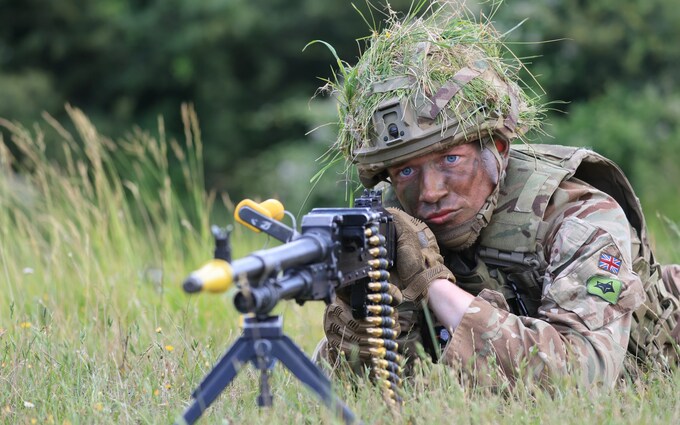
Bringing down Road has excused an admonition from the top of the English armed force that the UK public should be ready to wage war in a conflict against Vladimir Putin’s Russia since the present proficient military is excessively little.
Rishi Sunak’s representative said the head of the state disagreed with remarks made by Gen Sir Patrick Sanders in a discourse on Wednesday, and had to demand there would be no re-visitation of public help, which was canceled in 1960.
“Speculative situations” including conceivable future conflicts was “not useful”, the No 10 representative added, as the line opened up a break between the Moderates and the military when cuts mean the military is at its littlest for over 300 years.
The Service of Guard (MoD) likewise limited any association with the discourse, which was delivered by the English armed force for the benefit of the senior general, who is because of leave in the late spring, having passed up becoming top of the military quite a while back.
Talking at a tactical meeting, Sanders obviously depicted the English public as a feature of a “prewar age” who might need to set themselves up to battle in a conflict against an undeniably forceful Russia. The head of general staff featured the case of Sweden, which has recently once again introduced a type of public help as it surrounds joining Nato.
During the discourse in London, the military boss said the UK expected to follow Stockholm’s model and take “preliminary moves toward empower putting our social orders on a conflict balance extensively”. Such activity was “not just alluring, yet fundamental”, he added.
The establishments for “public preparation” couldn’t be restricted to nations adjoining or near Russia, and accordingly conventional individuals in the UK would be compelled to join the UK’s 74,110 full-time normal armed force to see off a functioning danger to central area Europe.
He said: “We won’t be resistant and as the prewar age we should comparably plan – and that is an entire of-country undertaking. Ukraine ruthlessly represents that ordinary armed forces start wars; resident armed forces win them.”
Sanders has recently griped freely and secretly about safeguard cuts. A year prior, trying to guarantee lawmakers stopped the hole with future spending, he cautioned that gifts of weapons to Ukraine would “leave us briefly more fragile”.
Such open contentions over cash have driven him into struggle with the MoD, in the midst of reports of conflicts with the head of protection staff, Adm Sir Tony Radakin. A few partners accept Sanders ought to have been elevated to supplant Radakin, yet he was approached to step down right on time in the wake of serving two of three years as armed force boss.
In his discourse, Sanders said the virus war harmony profit was finished, noticing that “throughout recent years, the military has been split in size; over the most recent 12 years, we’ve consumed a 28% decrease”. Enrollment stayed a test, he said, in spite of the fact that applications to join were “the most noteworthy in six years”.
Before Sanders gave his discourse, the MoD gave an explanation, saying it had no designs to advocate a re-visitation of public help.
“The English military has a glad practice of being a willful power and there is positively no idea of a re-visitation of enrollment,” the MoD said, adding that £50bn was being put resources into the military during the ongoing year.
With a political decision approaching, the military is trusting government officials make further promises over safeguard spending. Work has abstained from making any firm spending responsibilities, yet has scrutinized slices to the size of the military and vowed to send off a safeguard survey whenever chose.
Award Shapps, the protection secretary, this month rehashed that the UK needs to increment safeguard spending from 2.1% of Gross domestic product to 2.5% later on.
However, Sanders said: “The military has a liberal £44bn program north of 10 years, yet that cash is simply 18% committed. During a discretionary cycle, uncertain cash is powerless.”